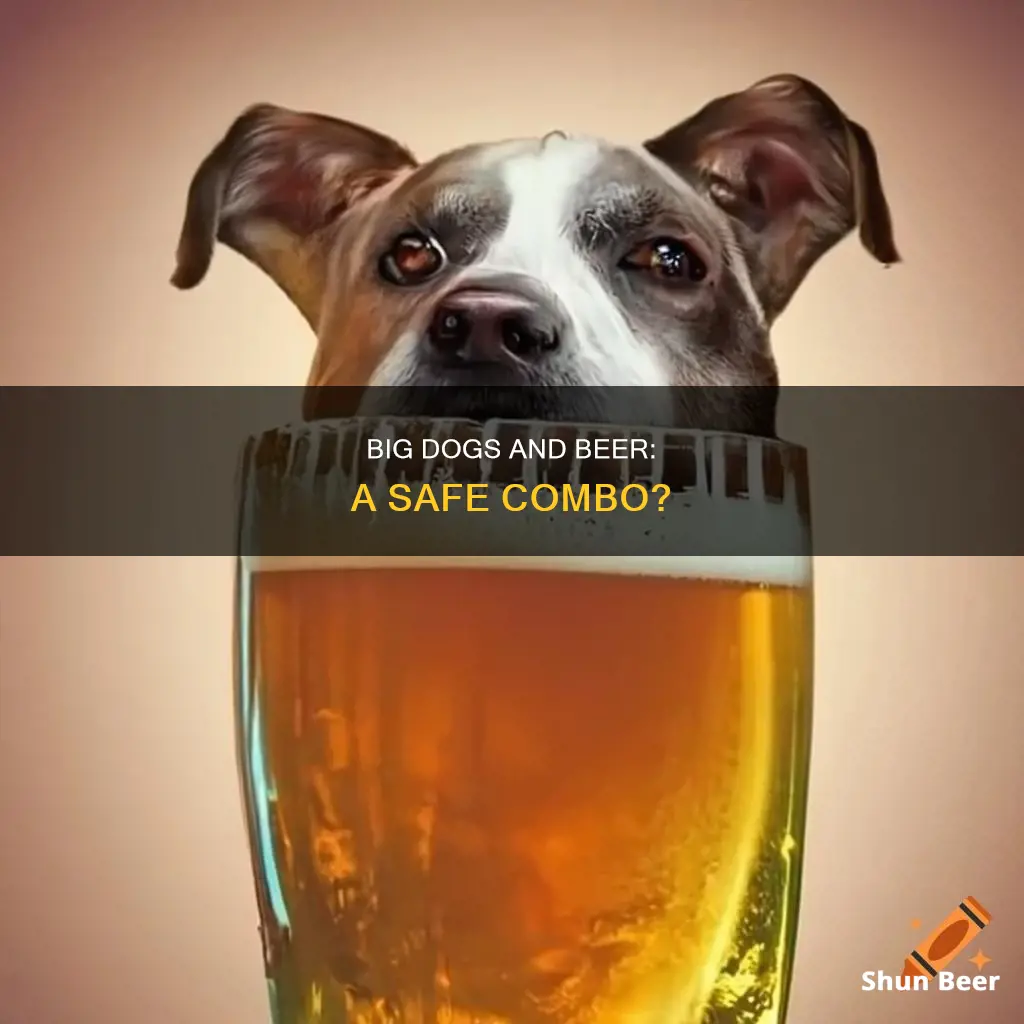
While it may be tempting to share a beer with your dog, especially when they give you those irresistible puppy eyes, it is important to know that beer and other alcoholic drinks are toxic to dogs and can lead to severe health issues or even death. Dogs are highly sensitive to the effects of alcohol, and even a small amount can be harmful. The health risks associated with alcohol poisoning in dogs include drunkenness, hops poisoning, organ failure, and in some cases, death. Therefore, it is crucial to keep alcoholic beverages out of your dog's reach and never intentionally give them beer or any other form of alcohol.
| Characteristics | Values |
|---|---|
| Beer safe for dogs? | No, beer is not safe for dogs to drink, even in small amounts. |
| Alcohol-free beer safe for dogs? | No, it may contain other toxic ingredients like hops, xylitol, or fruit extracts. |
| Why do dogs like beer? | Beer has a sweet taste and a smell that dogs like. They may also want to drink it because they want to get involved in family life and fit into the pack. |
| What happens if a dog drinks beer? | Dogs can quickly develop alcohol poisoning. They may appear drunk, confused, have difficulty walking and standing, and become more lethargic. |
| What to do if a dog drinks beer? | Contact a vet straight away. If it's been less than 15 minutes, a vet may induce vomiting to remove the alcohol from the dog's digestive system. |
What You'll Learn

Why beer is toxic to dogs
Dogs should never drink beer, even in small amounts. Beer is very toxic to dogs and can cause alcohol poisoning, drunkenness, and hops poisoning. While the human body has evolved to process alcohol efficiently, dogs' bodies have not.
Ethanol, the ingredient in beer that causes intoxication in humans, is toxic to dogs and can lead to poisoning. The published oral lethal dose in dogs is 5.5 to 7.9 g/kg of 100% ethanol. The amount of ethanol needed to cause intoxication varies depending on its concentration in the substance ingested. Beer contains a lower concentration of ethanol than hard liquor, wine, and craft beer, but it still poses a risk to dogs.
Dogs may be attracted to beer due to its sweet taste and smell, or because they want to be involved in family activities. However, even a few licks of beer can be enough to intoxicate a small dog. Symptoms of alcohol poisoning in dogs include confusion, difficulty walking and standing, lethargy, decreased breathing rate, low body temperature, abnormalities in electrolytes, low blood sugar, tremors, and seizures.
If you suspect your dog has consumed beer, contact your veterinarian immediately. Do not try to treat alcohol poisoning at home. The vet may induce vomiting to help remove the alcohol from the dog's digestive system. Early treatment is crucial, and with prompt veterinary care, a full recovery is expected within 24 to 36 hours.
To prevent your dog from consuming beer, keep alcoholic drinks out of their reach and never leave them unattended. If you have guests over, make them aware of the risk or keep your dog in a separate room.
Topsy Keurig Beer: Brewing Innovation Explained
You may want to see also

The health risks of dogs drinking beer
Beer is toxic to dogs and can lead to severe health issues and even death. While humans can process alcohol efficiently, dogs' bodies have not evolved to do so. Alcohol is absorbed faster and spreads more quickly through a dog's bloodstream. Even a small amount of beer can be dangerous for a dog, and the risk of alcohol poisoning is high.
The ethanol in beer is what causes poisoning in dogs, and the symptoms of ethanol poisoning include:
- High or low body temperature
- Shaking and trembling
- Hypoglycemia (low blood sugar)
In addition, dogs can experience drunkenness, which is a form of alcohol poisoning. They may feel unsettled or frightened as they don't understand why they can't walk properly or feel nauseous.
Other symptoms of alcohol poisoning in dogs include:
- Disorientation and lack of coordination
- Vomiting
- Depressed respiratory rate
- Low blood sugar, which can lead to body tremors and seizures
- Low blood pressure
- Low body temperature
If a dog has consumed a large amount of alcohol in relation to its size, alcohol poisoning can be fatal. This is because it overwhelms the organs and causes multi-organ failure.
Beer also contains hops, which are toxic to dogs. Hops can cause an increase in body temperature, a racing heart rate, and gastric upsets.
If your dog has consumed beer, it is important to contact a veterinarian immediately, even if they are not exhibiting any symptoms. The vet may induce vomiting to help remove the alcohol from the dog's digestive system. There is no specific treatment for alcohol poisoning, but medications can be used to offset the serious side effects. This may include IV fluids, IV dextrose to correct low blood sugar, anti-nausea medication, and providing warmth to combat low body temperature.
Hospitalization may be required to monitor the dog, and a full recovery is expected within 24 to 36 hours with prompt veterinary care.
Beers and Driving: How Many is Too Many?
You may want to see also

Signs of alcohol poisoning in dogs
Dogs should never drink beer or any other alcoholic beverage. Even a little alcohol can cause alcohol poisoning, especially in smaller dogs. Alcohol poisoning can occur through ingestion or absorption through the skin.
- Excessive salivation
- Frequent urination, which may include increased thirst
- Lack of coordination
- Staggering
- Excitement, which may change to depression
- Difficulty breathing (dyspnea)
- Loss of consciousness
- Slow heart rate (bradycardia)
- Heart rhythm problems
- Death
In severe cases, dogs may also experience:
- Low body temperature (hypothermia)
- Low blood pressure (hypotension)
- Low blood sugar (hypoglycemia)
- Metabolic acidosis (too much acid in the body)
- Seizures
- Coma
If you suspect your dog is suffering from alcohol poisoning, contact your veterinarian or a Pet Poison Helpline immediately. Do not try to treat alcohol poisoning at home.
Caveman Country: Beer, Fun and Adventure
You may want to see also

What to do if your dog drinks beer
If your dog drinks beer, it is important to remain calm but act quickly. Even a small amount of beer can be toxic to dogs and can cause alcohol poisoning.
Firstly, you should call your veterinarian, a local emergency clinic, or the Pet Poison Helpline. They will be able to advise you on the best course of action and let you know if treatment is necessary. It is helpful if you can tell the vet what type of beer your dog drank, how much they consumed, and when it occurred. If possible, take the bottle or packaging with you to the vet clinic.
If it has been less than 15 minutes since your dog drank the beer, a veterinarian may induce vomiting to help remove the alcohol from their digestive system. If your dog is staggering or disoriented, take them to the emergency vet immediately.
At the veterinary hospital, a veterinarian can help hydrate your dog, regulate their blood sugar levels and body temperature, and provide supportive care. They may induce vomiting to rid their body of the toxins, provide IV fluids, and administer IV dextrose to correct low blood sugar. Hospitalization may be required to monitor your dog and ensure they are on the road to recovery.
The prognosis for alcohol toxicity is often good with prompt veterinary care, and a full recovery is expected within 24 to 36 hours following treatment.
Temporary Crowns and Beer: What You Need to Know
You may want to see also

How to prevent your dog from drinking beer
Beer is toxic to dogs and can cause severe alcohol poisoning, so it is important to take steps to prevent your dog from drinking it. Here are some tips to keep your dog safe:
Put your dog in another room or their crate
If you are drinking alcohol, consider putting your dog in a separate room or their crate until you have finished. This will prevent them from having access to your drink and reduce the risk of accidental ingestion.
Store your alcohol carefully
Keep alcoholic drinks out of your dog's reach. Store bottles and cans on high shelves, and put them away promptly after opening. Keep open glasses away from edges to avoid spills, and always bring your drink with you when you leave the room.
Use a lidded glass
Consider drinking your beer from a glass with a lid. This may sound silly, but it can be an effective way to prevent your dog from accidentally drinking your beer.
Be vigilant when hosting guests
When hosting guests, inform them about your dog and ask them not to leave drinks unattended. You may also want to keep your dog in a separate room or crate during the gathering to prevent them from accessing alcohol.
Avoid alcohol-containing foods
In addition to beer, avoid giving your dog any food or treats that contain alcohol, such as bread dough, chocolates, or raw cookie dough. These can also be toxic and lead to alcohol poisoning.
Know the signs of alcohol poisoning
If your dog does ingest beer or any other form of alcohol, watch for signs of alcohol poisoning, including vomiting, disorientation, lack of coordination, tremors, and seizures. Seek immediate veterinary assistance if you suspect your dog has consumed alcohol.
Beer and Stool Softeners: Safe Mix or Health Risk?
You may want to see also
Frequently asked questions
No, beer is not safe for dogs to drink, even in small amounts. Beer is very toxic to dogs and can cause alcohol poisoning.
Signs of alcohol poisoning in dogs include depression or lethargy, lack of coordination, vomiting, low blood sugar, low blood pressure, and low body temperature.
If your dog drinks beer, you should contact your veterinarian, a local emergency clinic, or the Pet Poison Helpline immediately. Do not try to treat alcohol poisoning at home.
Yes, there are dog-safe alternatives to beer available, such as "dog beers" which are made mostly of water and bone broth and are alcohol-free. Plain water is also a good option for dogs.







